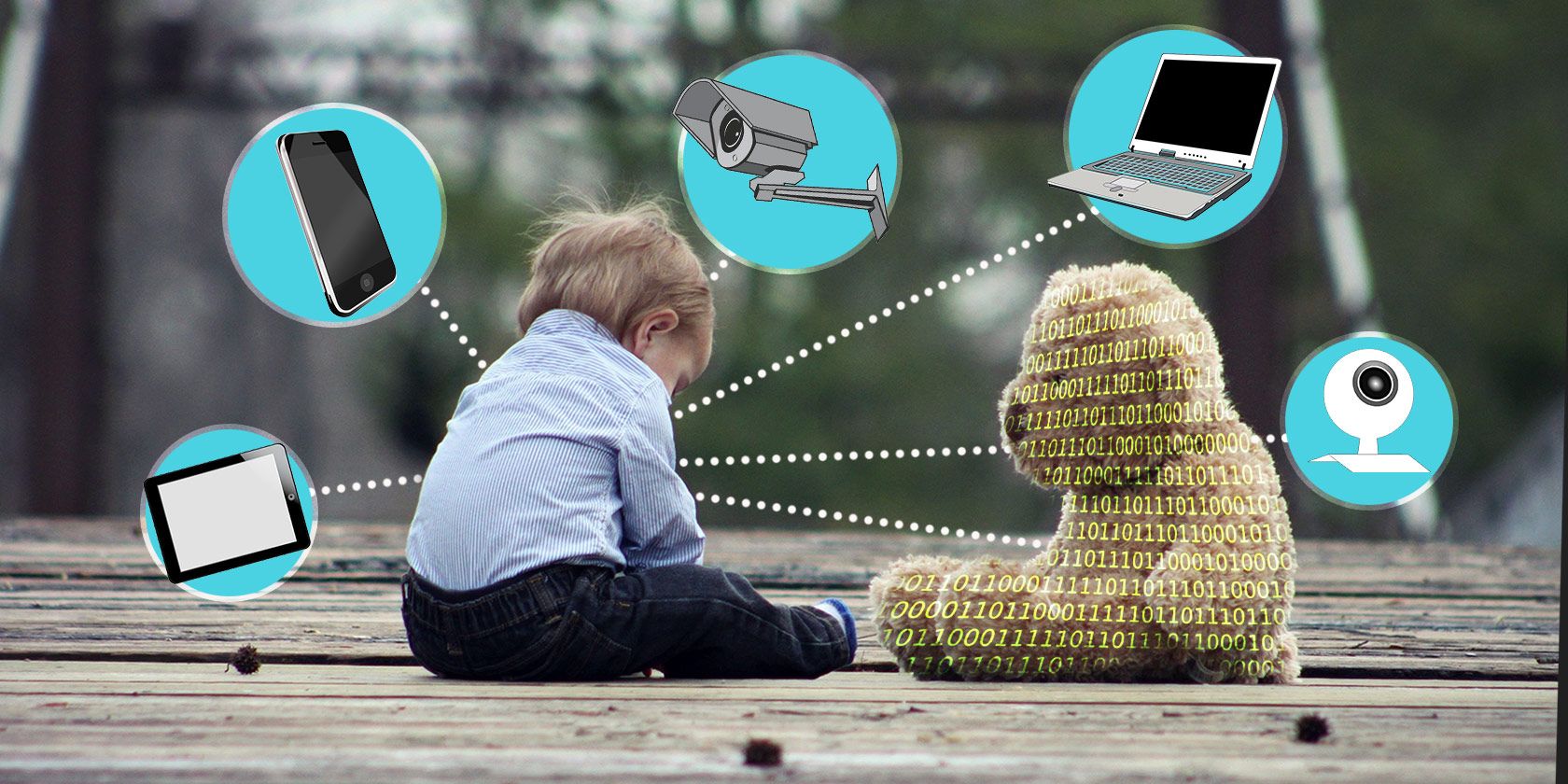If someone told you ten years ago that your teenager was going to take a video camera with them into the bathroom, what would you have said? I know what I would have said, and I can not repeat it here.
But it's now commonplace. Does that make it any less dangerous?
We could throw out then-and-now comparisons all day long, and yet some will sit there and justify it all with some version of, “But times have changed.” Sure, times have changed. That’s the nature of time.
But have people really changed? Aren’t those pervs and criminals still out there? Yes, yes they are. And they know how to use this technology, too. That can make mixing kids and technology a scary thing. Stay tuned to the end to see perhaps the scariest thing about how the Internet of Things (IoT) could hurt your children.
But let’s not be completely alarmist. The point of this is to make you aware of the potential problems so you can make educated choices. By learning about this, asking retailers and manufacturers tough questions, and putting pressure on our politicians for better privacy laws, things will get better. Or should I say the Internet of Things will get better?
WebCams and Children
Since the dawn of the web camera, there have been privacy concerns. How do you know if it's really off? How do you know if someone is accessing it and spying on my kids? Truth is, you probably don’t.
It is possible for someone to trick your kids into downloading remote administration tools (RATs). They’re kind of like VNC or TeamViewer; only you don’t know it’s there. Whoever tricks your kid into downloading a RAT can also turn off that LED that’s supposed to let them know if the web camera is on. Scary stuff.
Sometimes, the invasion of privacy may be accidental. Consider the Lower Merion Spy Cam Scandal. The gist of the story is that the school district loaned the kids laptops. The laptops had security software on it that activated the webcam. The school district ended up accidentally grabbing about 30,000 webcam images and about 27,000 screen captures. The district officials claimed they had no idea this could happen and dumped the blame on their IT staff. Is ignorance really a defense?
Sounds so scary. Yet there are simple things you can do to help prevent this.
The first thing you can do is determine if your kids really need a device with a camera. Chances are they don’t. But if you and your kids think a camera is okay, then have a talk about how that camera can be used for good and for bad. Knowing both sides of the situation, they’re better able to respect the technology.
Teach them that there are only a few people it's okay to use a webcam with. People like grandma and grandpa, you and your spouse, maybe some friends who have moved away. You could establish a specific list. If they want to chat on a webcam with their friends nearby, maybe that’s a good opportunity to have them go outside and go see their friends.
Take a good read through Joel Lee’s article, Hack Attack: How To Keep Your Webcam Secure From Online Peeping Toms. Make special note of the simple step of unplugging the webcam or covering it with a piece of electrical tape. You could also get fancy re-useable stickers specially made for webcams [Broken URL Removed]. They're kind of cute and reusable.
Internet of Toys
The video game is no longer the sole force in digital play. Classics like Barbie have gone online, and maybe gone rogue. Did you hear about security researcher Matt Jakubowski discovering a flaw with IoT toy Hello Barbie that could reveal a doll owner’s home address?
Matt says hackers could,"…replace their servers and have her (Barbie) say anything we want." Is that the worst possible outcome? Maybe not. Maybe listening to what Barbie is already programmed to say could be more harmful. She’s not big on equality between the sexes, apparently.
However there are things you can do to teach your daughters to think for themselves, especially in this online world. For a laugh that's also a warning, watch this video where Hello Barbie talks feminism.
You might have heard about this next one. VTech, makers of lots of different tech toys, makes a tablet device aimed at the under–10 crowd. It has it’s own app store known as the Learning Lodge. A British man was arrested last year for hacking into the back-end of the Learning Lodge and stealing data about 6 million kids and parents.
According to VTech’s press release, this included the parents, "…names, email addresses, secret questions and answers for passwords, IP addresses and download histories." VTech also said the hacked database contains, "…kids information including name, genders and birthdates."
Do you know what an evil person could do with that information? John Sileo, author of Stolen Lives: Identity Theft Prevention Made Simple, says, "…the most dangerous piece of information you can give out is your birth-date." He goes on to say, "A birthdate, along with a name and hometown can be used in a formula to recreate your Social Security information."
Another kids’ classic, Hello Kitty, was the source for a leak of information about 3.3 million of her fans. It happened when Hello Kitty’s fan site, SanrioTown.com, had its database accessed in late 2015. Here’s the catch - it wasn’t hacked. According to security researcher Chris Vickery of Kromtech, no hack was necessary. Vickery stated that pretty much anyone could access, "…first and last names, birthday…, gender, country of origin, email addresses, unsalted SHA–1 password hashes, password hint questions, their corresponding answers…," and more.
Think about that. What could you do if you knew the answers to someone’s password hint questions? Many of these questions are things like, "What was your first pet’s name?", or "What was the name of your elementary school?", or "Who was your favorite teacher?" Plenty of sites use the same questions. You can see how bad this could get.
How do you protect your children from this? Be involved. It’s that simple. Take the time to learn about their world and their new high-tech playthings. You could help them ride a bike because you knew about the fun and dangers of riding a bike. This is no different. Teach them about good security behavior when they're online. Do use parental controls on computers and tablets. Be nearby when they play with these things. Steer them away from the things they just aren't ready for yet.
The Worst Threat from the IoT for Our Children
The worst threat for our children from the IoT is us. By surrounding our child with sensors that tell us everything, or cameras and trackers for them, or devices like Amazon's Echo to answer their questions, we could be disconnecting the parent from the child. When the way kids interact with reality is only virtual, they might disconnect from society without even knowing it.
Two different studies show that, "…extensive use of new technology has raised concerns that children’s face-to-face communication skills may be negatively affected (Bindley, 2011 and Giedd, 2012)."
Susan Greenfield, neuroscience researcher at Oxford University, suggests that a constant connection to the Internet may be 're-wiring the brain'. She suggests that it could be shortening the attention span, encouraging instant gratification, and causing a loss of empathy. Consider reading her book on the matter, Mind Change: How Digital Technologies Are Leaving Their Mark on Our Brains.
There may be wisdom in Greenfield’s statement that, "We should acknowledge that this is bringing an unprecedented change in our lives and we have to work out whether it is for good or bad. Some very good things are coming out of it. But, by the same token, we have got to be very careful about what price we are paying, that the things that are being lost don’t outweigh the things gained."
Maryanne Wolf, cognitive neuroscientist at Tufts University, is also very concerned about the connected nature of our children’s lives. Her thoughts are well supported by the research she did for her book, Proust and the Squid: The Story and Science of the Reading Brain.
Wolf suspects that the adults of tomorrow, "…may never have formed those precious abilities to attend and focus in a very concentrated way in order for them to connect to their own best thoughts." In shorter terms, "TV produced soundbite culture; online reading is producing eyebite culture."
It’s not just the technology in your kids’ hands creating the problem. Take a look at your own hands. You’re online right now. Are you at the dinner table, or sitting in a room with the kids? If your attention is here, then you’re not really with the kids, are you? They see that. The study Not at the Dinner Table: Parents’ and Children’s Perspectives on Family Technology Rules shows that your kids want you to, "… unplug when spending time with family."
The same study showed that if kids could enforce tech rules for parents, the top two would be to be present and to supervise them.
Isn't that what parents want to do? Don’t they want their kids to also be present and be open to being supervised? Who knew? It does make some sense if we consider, "…the fact that parents’ media habits predict children’s media habits." Why wouldn't their needs also reflect our needs?
All Internet of Things in Moderation
Whether you’re concerned about child abduction or exploitation, re-inforcing of gender sterotypes, identity theft, or just plain old family time, the IoT is only a threat if you let it be. Learn about it. Educate your kids about it. You control how far the IoT comes into their lives and yours. With balance, there’s no reason the IoT can’t be a family enhancing tool.
Image Credits: little boy and Girl Playing with Mobile Phones, Uncle Plays Video Games with His Nephews, Modern Technology in Home, Indoor, Dangerous Online Friendship Concept, Closeup of Senior Couple Sending Messages through Web Cam, via Shutterstock, Webcam Hacks Trendnet, via Network World







